In the competitive landscape of compact SUVs, the Ford Kuga and Mitsubishi Eclipse Cross stand out as intriguing options for drivers prioritizing both style and performance. Below, we delve into a detailed comparison of these two vehicles, focusing on their technical aspects and innovative features.
Ford Kuga vs Mitsubishi Eclipse Cross - Differences and prices compared
Compare performance (243 HP vs 218 HP), boot space and price (34200 £ vs 41100 £ ) at a glance. Find out which car is the better choice for you – Ford Kuga or Mitsubishi Eclipse Cross?
Design & Dimensions
Starting with the exterior, the Ford Kuga boasts a length ranging from 4604 mm to 4645 mm, offering a more spacious presence compared to the Mitsubishi Eclipse Cross, which measures 4545 mm. The Kuga's width of 1882 mm is also notably broader than the Eclipse Cross's 1805 mm, contributing to its more imposing stance on the road. When it comes to height, both vehicles are relatively close, with the Kuga measuring between 1673 mm and 1681 mm, while the Eclipse Cross stands a bit taller at 1685 mm.
Powertrain Options & Performance
The Kuga offers a range of powertrain options, including petrol, full hybrid, and plug-in hybrid configurations. With power outputs ranging from 150 HP to an impressive 243 HP, drivers can choose between efficient engines and robust performance. The Kuga's acceleration times are impressive as well, with the fastest variant capable of sprinting from 0-100 km/h in just 7.3 seconds. In terms of fuel efficiency, the Kuga provides a commendable consumption rating of up to 5.3 L/100 km.
In contrast, the Mitsubishi Eclipse Cross is solely available as a plug-in hybrid, producing 188 HP. While it may not offer as varied an engine lineup as the Kuga, the Eclipse Cross impresses with a low fuel consumption rate of just 2 L/100 km, highlighting its eco-friendly credentials. Acceleration is where it lags behind, however, clocking in at 10.9 seconds from 0-100 km/h.
Electric Capabilities & Emissions
The Ford Kuga shines with an advanced hybrid offering, boasting an electric range of up to 69 km, while its hybrid variants achieve impressive CO2 emissions ratings. The Kuga emits between 20 g/km and 145 g/km, depending on the model selected, thanks to its efficient engineering.
The Mitsubishi Eclipse Cross, while focusing on plug-in hybrid technology, provides an electric range of 45 km and an efficient emissions output of only 46 g/km. This makes it an attractive option for environmentally conscious drivers, especially for urban environments where electric driving is advantageous.
Interior & Comfort Features
Both vehicles comfortably seat five passengers, but the Kuga edges out slightly with a trunk capacity of 412 L, surpassing the Eclipse Cross's 359 L. Interior design in both models emphasizes modern aesthetics and user-friendly technology, showcasing high-quality materials and ergonomic placement of controls.
Innovations set these two SUVs apart as well. The Kuga is equipped with Ford's latest SYNC 3 infotainment system, incorporating smartphone integration features, voice command capabilities, and advanced navigation systems. The Eclipse Cross, on the other hand, features Mitsubishi's smartphone link display audio, providing essential connectivity for tech-savvy users. While both vehicles offer substantial tech integrations, the Kuga's suite may ultimately feel more comprehensive to the average consumer.
Safety Ratings & Features
Safety is a compelling factor for almost any SUV buyer, and both models come equipped with a suite of advanced safety features. The Kuga includes Ford Co-Pilot360, which offers features such as automatic emergency braking and lane-keeping assist. The Eclipse Cross also provides robust safety features, including adaptive cruise control and multi-around view monitoring.
Conclusion
In the battle of the Ford Kuga versus the Mitsubishi Eclipse Cross, each SUV has its strengths. The Kuga offers greater versatility in engine choices, superior acceleration performance, and a more generous cargo capacity. Meanwhile, the Eclipse Cross is an ideal choice for eco-conscious drivers looking for impressive fuel efficiency and low emissions.
Ultimately, the decision will hinge on personal priorities: whether you lean towards performance and space (Kuga) or efficiency and urban adaptability (Eclipse Cross). Each vehicle presents an appealing package in its own right, tailored to meet a diverse range of consumer needs.
Here’s where it gets real: The technical differences in detail
Costs and Efficiency:
Looking at overall running costs, both models reveal some interesting differences in everyday economy.
Ford Kuga has a clearly perceptible advantage in terms of price – it starts at 34200 £ , while the Mitsubishi Eclipse Cross costs 41100 £ . That’s a price difference of around 6892 £.
As for electric range, the Mitsubishi Eclipse Cross performs clearly better – achieving up to 635 km, about 567 km more than the Ford Kuga.
Engine and Performance:
Under the bonnet, it becomes clear which model is tuned for sportiness and which one takes the lead when you hit the accelerator.
When it comes to engine power, the Ford Kuga has a to a small extent edge – offering 243 HP compared to 218 HP. That’s roughly 25 HP more horsepower.
In acceleration from 0 to 100 km/h, the Ford Kuga is minimal quicker – completing the sprint in 7.30 s, while the Mitsubishi Eclipse Cross takes 7.90 s. That’s about 0.60 s faster.
In terms of top speed, the Ford Kuga performs slightly better – reaching 200 km/h, while the Mitsubishi Eclipse Cross tops out at 170 km/h. The difference is around 30 km/h.
There’s also a difference in torque: Mitsubishi Eclipse Cross pulls somewhat stronger with 300 Nm compared to 240 Nm. That’s about 60 Nm difference.
Space and Everyday Use:
Cabin size, boot volume and payload all play a role in everyday practicality. Here, comfort and flexibility make the difference.
Both vehicles offer seating for 5 people.
In terms of boot space, the Mitsubishi Eclipse Cross offers slightly more room – 487 L compared to 412 L. That’s a difference of about 75 L.
In maximum load capacity, the Mitsubishi Eclipse Cross performs barely noticeable better – up to 1670 L, which is about 136 L more than the Ford Kuga.
Who wins the race in the data check?
The Mitsubishi Eclipse Cross is far ahead overall in the objective data comparison.
This result only shows which model scores more points on paper – not which of the two cars feels right for you.
Costs and Consumption
View detailed analysis
Engine and Performance
View detailed analysis
Dimensions and Body
View detailed analysis
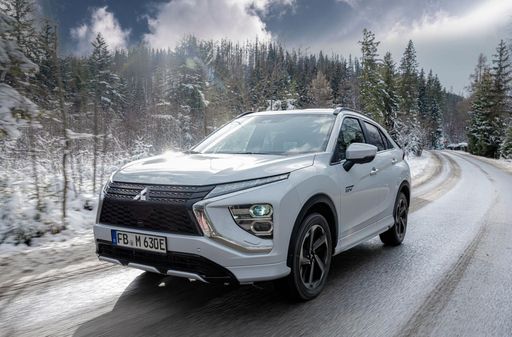
Mitsubishi Eclipse Cross
Ford Kuga
The Kuga is Ford’s adaptable family SUV that blends usable space with a surprisingly lively driving character, making daily commutes and weekend escapes equally enjoyable. With smart interior packaging, an easy-to-use infotainment setup and composed road manners, it’s a sensible choice for buyers who want a bit of fun without the fuss.
details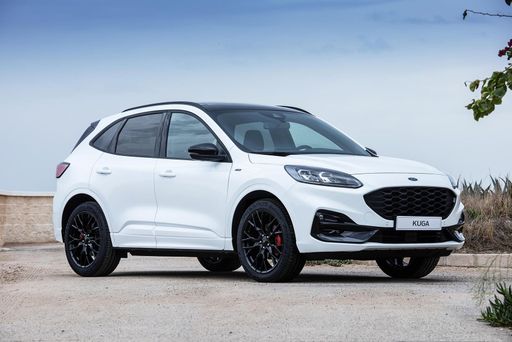
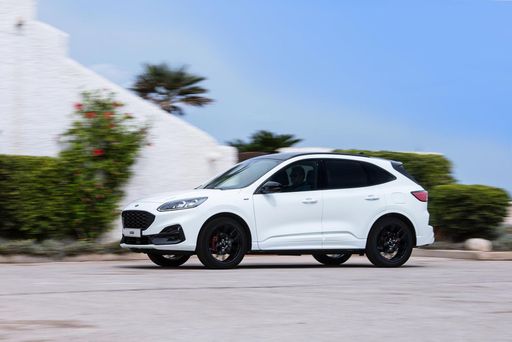

Mitsubishi Eclipse Cross
Mitsubishi Eclipse Cross combines coupe-like looks with crossover practicality, so you get style without the showroom attitude. It’s an affable daily driver that hides a few quirks behind a confident grin, making it an easy pick for buyers who want personality without fuss.
details
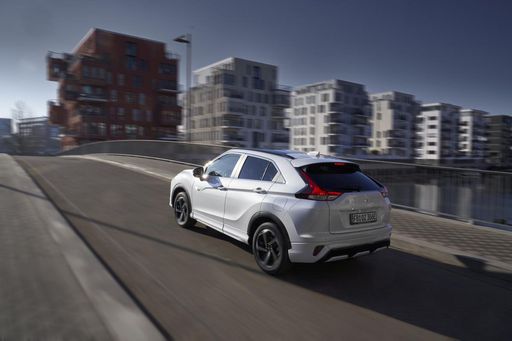
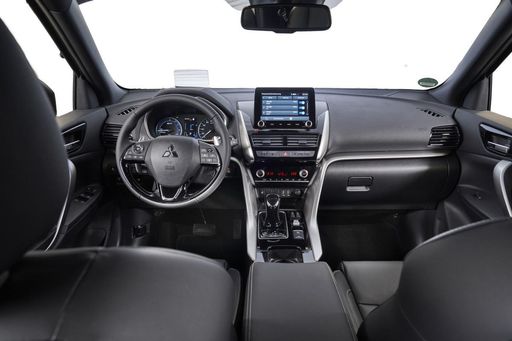
Costs and Consumption |
|
|---|---|
|
Price
34200 - 46300 £
|
Price
41100 - 48200 £
|
|
Consumption L/100km
2.8 - 6.8 L
|
Consumption L/100km
-
|
|
Consumption kWh/100km
-
|
Consumption kWh/100km
16.7 - 16.9 kWh
|
|
Electric Range
68 km
|
Electric Range
635 km
|
|
Battery Capacity
1.1 - 14.4 kWh
|
Battery Capacity
-
|
|
co2
55 - 154 g/km
|
co2
0 g/km
|
|
Fuel tank capacity
42 - 54 L
|
Fuel tank capacity
-
|
Dimensions and Body |
|
|---|---|
|
Body Type
SUV
|
Body Type
SUV
|
|
Seats
5
|
Seats
5
|
|
Doors
5
|
Doors
5
|
|
Curb weight
1526 - 1859 kg
|
Curb weight
-
|
|
Trunk capacity
412 L
|
Trunk capacity
487 L
|
|
Length
4604 - 4645 mm
|
Length
4489 mm
|
|
Width
1882 mm
|
Width
1908 mm
|
|
Height
1673 - 1681 mm
|
Height
1571 mm
|
|
Max trunk capacity
1534 L
|
Max trunk capacity
1670 L
|
|
Payload
541 - 550 kg
|
Payload
-
|
Engine and Performance |
|
|---|---|
|
Engine Type
Petrol, Full Hybrid, Plugin Hybrid
|
Engine Type
Electric
|
|
Transmission
Manuel, Automatic
|
Transmission
Automatic
|
|
Transmission Detail
Manual Gearbox, CVT, Automatic Gearbox
|
Transmission Detail
Reduction Gearbox
|
|
Drive Type
Front-Wheel Drive, All-Wheel Drive
|
Drive Type
Front-Wheel Drive
|
|
Power HP
150 - 243 HP
|
Power HP
218 HP
|
|
Acceleration 0-100km/h
7.3 - 9.9 s
|
Acceleration 0-100km/h
7.90 s
|
|
Max Speed
195 - 200 km/h
|
Max Speed
170 km/h
|
|
Torque
240 Nm
|
Torque
300 Nm
|
|
Number of Cylinders
3 - 4
|
Number of Cylinders
-
|
|
Power kW
111 - 178 kW
|
Power kW
160 kW
|
|
Engine capacity
1496 - 2488 cm3
|
Engine capacity
-
|
General |
|
|---|---|
|
Model Year
2025
|
Model Year
2025
|
|
CO2 Efficiency Class
E, D, B
|
CO2 Efficiency Class
A
|
|
Brand
Ford
|
Brand
Mitsubishi
|
What drivetrain options does the Ford Kuga have?
The Ford Kuga is available as Front-Wheel Drive or All-Wheel Drive.
